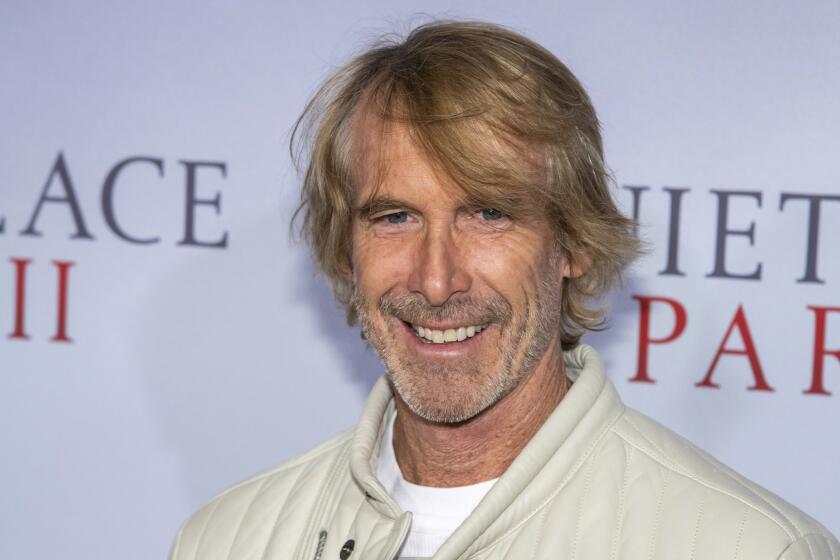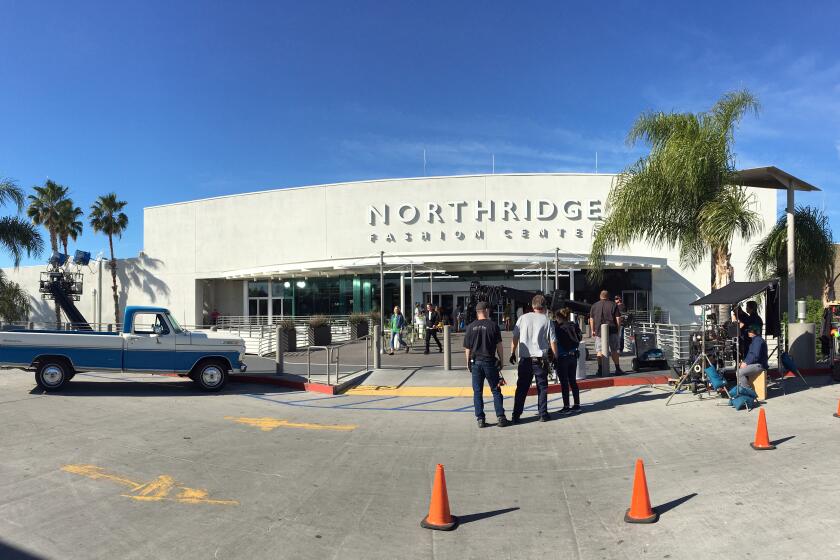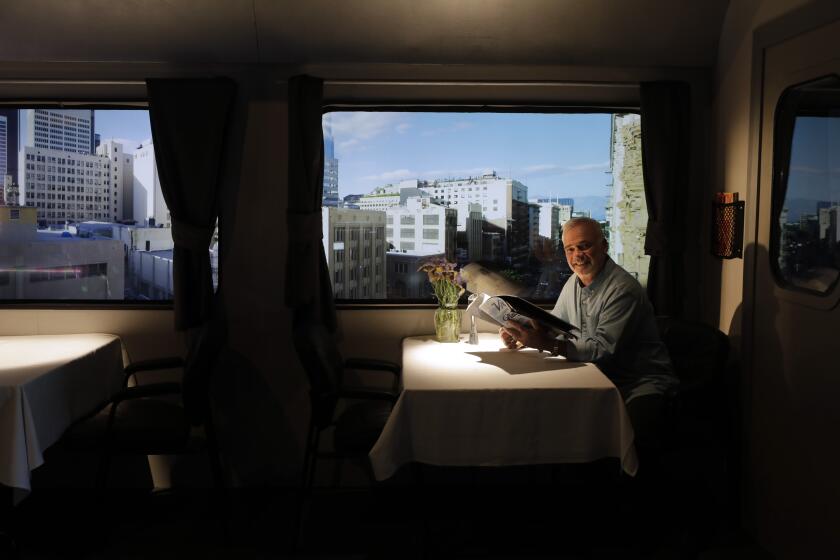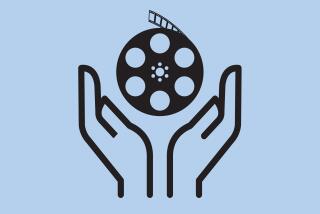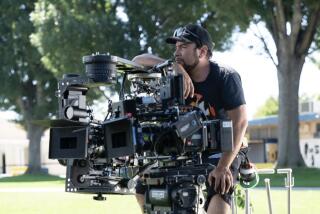Here’s why resuming TV and film production has gotten so complicated
“The Bold and the Beautiful” had been on the air 33 years without a break until the COVID-19 pandemic forced a shutdown across Hollywood in March. After local health officials and unions permitted filming to restart June 17, the show hit another roadblock.
Producers of the soap opera took multiple precautions: They used dolls and actors’ real-life partners as “stunt kissers,” cut the crew by about 20% and separated directors with Plexiglas at Television City studios in Los Angeles. But conducting 200 coronavirus tests weekly proved daunting. The first round yielded too many inconclusive results, making producers nervous about an outbreak.
So they shut down again while testing moved to a new lab, which was able to deliver more reliable results, and production resumed two days later.
“It’s been a financial strain,” said the show’s executive producer and head writer, Bradley Bell. “We are doing everything we can and sparing no expense to make sure we are working in a safe environment.”
Four months since the COVID-19 pandemic halted film and TV shoots, Hollywood has struggled to get back to business. Film sets, known for being crowded and often unclean, have faced a raft of challenges, including complying with testing and other rigorous health-and-safety rules intended to curb new outbreaks, dealing with unwelcoming neighborhoods and extra scrutiny by unions.
So far, most of the filming activity has been confined to small commercials and music videos. But the problems are expected to intensify as 100-plus teams for major movies and TV series resume filming on the streets of L.A.
“A lot of people imagined that this was going to be like flipping a light switch and everything was just going to turn back on, and it’s proving not to be quite like that,” said Duncan Crabtree-Ireland, SAG-AFTRA chief operating officer and general counsel. “But we are seeing the pace getting quicker, especially for shorter duration productions like commercials, music videos and other productions that need just a few days.”
In recent months, unions and an alliance of major Hollywood studios have collaborated with L.A. County health officials to create safety guidelines that would avoid outbreaks on film sets.
“So far we have been able to get cooperation from almost all producers on the safety standards we are looking for,” Crabtree-Ireland said. “We are talking various groups of employers in the industry to establish mutually agreed, detailed protocols that we believe will become the automatic default for all those production environments.”
Among other measures, the new rules require on-set COVID-19 safety officers to enforce safety protocols; frequent cleaning of areas and equipment; limited filming hours; and the creation of zones separating crew who cannot socially distance or wear masks as part of their jobs. They will have to be tested every three days while others, who can maintain distance and wear protective equipment, would be tested once a week.
Some productions, however, have struggled to comply with the rules.
“Songbird,” a thriller set in 2022 and coproduced by Michael Bay , was hit with a rare Do Not Work notice from SAG-AFTRA on July 2. The producers had “not been transparent about their safety protocols,” SAG-AFTRA spokeswoman Pamela Greenwalt said.
The notice meant none of the union’s members, including the movie’s star, Demi Moore, would be able to participate in the shoots planned around Los Angeles. Within 24 hours, the union rescinded the notice after the production finalized and signed an appropriate safety protocol, a person with knowledge of the production said.
The troubles didn’t stop there. The filmmakers planned to film over several days and at night in Boyle Heights. Some residents, however, balked at the prospect of having a large production in their neighborhood.
“We were just worried about COVID-19 risk and the parking situation. Everything right now is tough and having any disruption to your routine is a big issue,” said Sam Cornwall, a 34-year-old photographer who lodged a complaint with FilmLA, the nonprofit group that handles film permits. “No one needs to die for a Michael Bay movie. We have a lot of neighbors at risk.”
The union representing film actors tells members not to work on the pandemic thriller ‘Songbird’ out of coronavirus concerns.
The complaint became moot when the company moved the shoot to another location to accommodate a script change.
“Throughout the preproduction process we have remained in close discussions with the guilds and various Hollywood film groups, and our new production model meets and exceeds all safety guidelines outlined by not only SAG but also L.A. County Public Health‘s white paper, ‘The Safe Way Forward,’ and FilmLA,” the company said.
FilmLA has issued about 350 permits since mid-June and received roughly three dozen complaint calls. Of the total 54 issues raised, 17 had to do with illegal productions that were later shut down by police.
“That is one of the greatest concerns we have because that nonpermitted film activity is probably not either aware of, or following, those guidelines,” FilmLA President Paul Audley said.
Seven complaints were related to COVID-19, mainly from residents worried about interacting with crews and about the safety requirements on set.
The biggest impediment to returning to business is testing, Audley said.
A new report paints a bleak portrait of the impact of the COVID-19 pandemic on location shoots in the Los Angeles region.
“Everyone, not just the film industry, everyone is having a problem right now getting tests and getting those test results back quickly,” he said. That can lead to delays in or cancellations of film shoots.
“Courting Mom & Dad,” a family movie featuring actor Scott Baio, also was called out by SAG-AFTRA.
The union on June 13 issued a Do Not Work order for the movie, which was filming throughout L.A., because it had not complied with the new COVID-19 safety rules, including mask wearing and social distancing. The union said it is working with the production to resolve the matter. Pure Flix, the film’s producer and distributor, did not respond to requests for comment.
“There are people in the industry with all different viewpoints, including people who question the science behind the protocols or the validity of the pandemic itself,” Crabtree-Ireland said. But the lengthy rules set out by health officials are designed to avoid outbreaks, even if cast or crew members aren’t sheltering at home or taking precautions, he said.
“Euphoria” showrunner Sam Levinson has completed production on “Malcolm & Marie,” a movie starring Zendaya and John David Washington, entirely in quarantine.
Despite the measures, some performers and crew members are worried about the risk of infection. Bell said that not everyone from the original cast and crew of “The Bold and the Beautiful” returned to filming because of concerns about the health risks.
Some productions, however, have been using the new guidelines without issue.
The cast and crew of the Focus Features thriller “The Card Counter,” starring Oscar Isaac, returned to Biloxi, Miss., this month to complete shooting that had been halted in March after a supporting cast member tested positive for the virus.
This time, all the cast and crew were tested before they could even attend production meetings, said Ryan McCormick, the film’s makeup department head.
The entire crew had their temperatures taken daily, and McCormick was tested for COVID-19 again three days into the shoot.
She wore a mask, like everyone else on set, and a face shield to do the makeup of the leading actors. Contact was minimized, with only one person at a time allowed to touch the actors. Hand sanitizer was handed out, and there were frequent reminders to clean up, she said.
Hollywood wants to get back to work but with the threat of COVID-19 unabated, producers are turning to virtual filmmaking to complete shoots
“I was very trepidatious at first, but I felt like they really knew what they were doing and spared no expense to make sure crew and cast were safe,” said McCormick, a veteran makeup artist who is based in Salt Lake City. “They were taking it very seriously. I felt as safe as you possibly can.”
Still, a growing concern for producers is the rising number of COVID-19 cases. L.A. officials have warned of a new stay-at-home order, which would imperil what little filming has started in the county.
“Everyone is reluctant to start a shoot that could be shut down,“ said Sam Nicholson, chief executive of Pasadena visual effects company Stargate Studios. “I do believe that until we get our new COVID-19 infection rate under control, that everyone in the production chain from the studios, to producers and directors, to actors and crew, lack the confidence to make any substantial local production commitments.”
More to Read
Inside the business of entertainment
The Wide Shot brings you news, analysis and insights on everything from streaming wars to production — and what it all means for the future.
You may occasionally receive promotional content from the Los Angeles Times.
